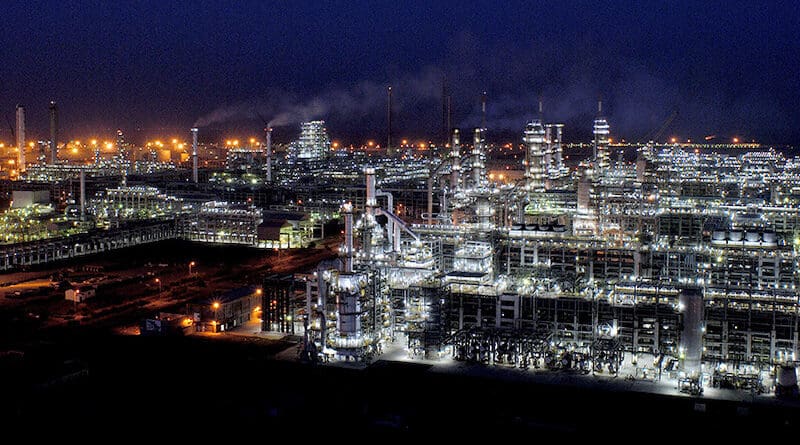Syed Raiyan Amir

The commencement of the Ukraine war in February 2022 sparked an unforeseen surge in energy trade, particularly in oil, between Russia and India. Prior to the war, Russia contributed a mere one percent to India’s total oil imports. However, within a year, this share witnessed a remarkable escalation, reaching 35 percent. This surge catapulted India to the position of the third-largest purchaser of Russian crude oil globally, trailing only China and the USA.
As of April 2023, India ascended to the position of the largest energy supplier to European nations. This rise aligns with the convergence of factors, namely the availability of inexpensive Russian energy and the effective contributions of key oil refineries such as Indian Oil Corporation (IOC), Bharat Petroleum Corporations Limited (BPCL), and Nayara Energy. Notably, India has been exporting refined oil to Europe in quantities surpassing even those of Saudi Arabia. The three pivotal elements contributing to this phenomenon encompass the ongoing Russia-Ukraine war facilitating an excess of affordable Russian oil to India, the imposition of EU sanctions and price constraints on Russian oil imports, and the operational efficiency of Indian refining companies.
From the outset of the war, India’s acquisition of Russian oil at a notably economical rate has surged by an astonishing 1,350%. This unanticipated escalation in Russian energy supply has proven advantageous for both nations. For Russia, it has facilitated the ongoing war effort against Ukraine, while concurrently allowing India to amass significant foreign reserves. The surplus of Russian energy supply has empowered India to address the energy needs of resource-strapped European nations grappling with an energy crisis triggered by the commencement of the war.
In the span of a year, India’s intake of oil from Russia surged from 30.85 lakh tonnes to a substantial 55.9 million tonnes. Following the imposition of sanctions and price constraints, India maximized the export of Russian oil to Europe. Essentially, India is engaged in refining Russian oil and subsequently exporting the refined product to the European market. The process is reminiscent of a “Laundromat,” where countries acquire cheap Russian oil, refine it locally, and then sell it to Europe. However, India has faced criticism for exporting refined oil to the EU, with detractors contending that it is akin to cleansing the tarnished reputation of Russian oil.
The third pivotal factor lies in India’s oil refining industry, renowned as the world’s largest, with the capacity to exceed its domestic energy demands. However, India’s oil reserve capability is minimal, lasting only for a month. In this context, with Indian refining companies benefitting from a cost-effective energy supply that reduces refining expenses, their role in augmenting the export of petroleum products through surplus supply is commendable and advantageous for the Indian economy. Notably, India has surpassed Saudi Arabia in exporting clean oil to the EU.
The import of Russian oil through Indian refineries presents a double-edged sword for the EU. While the EU seeks alternative sources of oil, it simultaneously grapples with concerns regarding reliance on Russian energy. The energy (oil) trade between the EU and India remains legal under EU sanctions, yet it has garnered criticism from EU’s chief diplomat, Josep Borrell. In May 2023, Borrell called for a crackdown on India’s resale of Russian oil into Europe, highlighting the contentious nature of this trade relationship.
In the span of a year, India has accrued savings of 35 thousand crore rupees through the acquisition of cost-effective oil from Russia. Simultaneously, it has strategically positioned itself as a significant supplier of petroleum products. While India undeniably reaps benefits from its flourishing refining industry, the sustainability of its larger energy supplier role to the EU post-war is dubious due to its perceived short-term capability.
Following the conclusion of the war, India may forfeit the price discount on Russian-imported energy, potentially diminishing its status as an energy exporter to the EU. Despite these gains, India’s reputation has suffered to some extent, with accusations of indirectly aiding Russia by importing inexpensive Russian oil and thus alleviating the impact of sanctions. Nayara Energy, owned by Rosneft, a Russian oil company, has notably thrived from Russia’s economically advantageous energy supply to India. Furthermore, the trade conducted in Ruble and Rupees has played a role in the recovery of the Russian currency from the adverse effects of sanctions.
Given the transformed geopolitical landscape and the urgent energy needs of the EU, India emerges as a key player in the global and European energy markets by actively supplying energy. Therefore, the ongoing Ukraine war, coupled with the provision of affordable Russian oil and geopolitical advantages, has positioned India as a transient yet significant energy supplier to the EU.
No comments:
Post a Comment